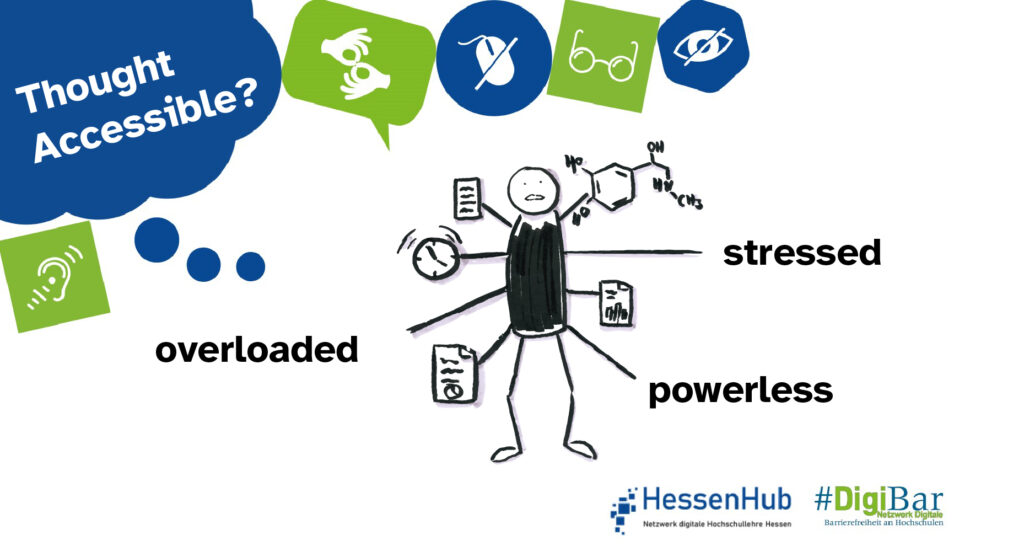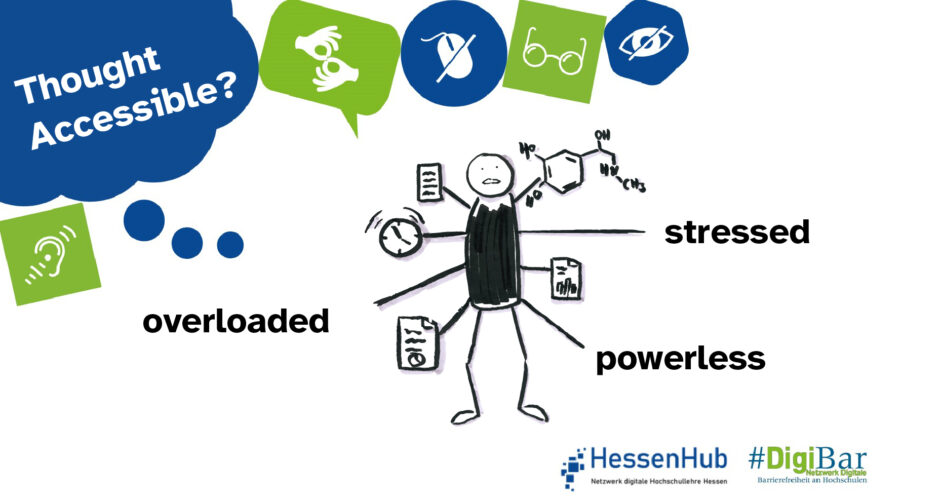Diese Seite gibt es auch auf Deutsch.

Think Accessible!
Psychological stress can manifest itself in everyday (university) life by making it very difficult for those affected to function. Concentration on learning, motivation and performance can suffer. The effects vary greatly for those affected and are often invisible to outsiders.
Many students do not dare to seek help from teachers. Often the fear of prejudice and discrimination is too great to open up a conversation. Sensitivity and openness to the issue can help those affected. Teachers can create space for interaction at the beginning of the semester by offering the possibility of a non-binding conversation, asking about needs or pointing out support services offered by their universities. The focus here should be on dealing with a heterogeneous student body in a trusting and sensitive manner (not on dealing with a specific illness).
Teachers can find support and further information from their universities – courses and in-service training are often available for teachers who wish to develop their skills in this area.
Further information.
In May 2023 the Bundesministerium für Bildung und Forschung – BMBF (the Federal Ministry of Education and Research) published “Die Studierendenbefragung in Deutschland: 22. Sozialerhebung” (“The Student Survey in Germany: 22nd Social Survey”). In addition to the economic and social situation of students in Germany from 2021, this also includes figures that provide information on how many students with impairments there are and how they affect their studies.
Here are some of the key findings:
- Overall, just under 24 percent of students report being health impaired […]. In terms of all students, almost 16 percent report at least one health impairment that has an aggravating effect on their studies (BMBF, 2023, P.42)
- It is striking that among all students with an impairment that makes their studies more difficult who indicated the type of impairment(s), mental illness is by far the most common […]. Overall, about 65 percent of students with a study-impairing impairment report having a mental illness (ibid, P.44).
If we take a closer look at the extent of study difficulty among students with study-impairing impairment, overall, by gender and type of impairment with regard to mental illness 66.1% report that the impairment has a (very) strong impact on their studies (ibid P.45).
Weblinks
- arte: video series “Psyche” (e.g. “Living With Autism”, “Dealing With Depression”, “Fear”) (last retrieved on 27/07/2023)
- Deutsches Studierendenwerk: Studying with disabilities (last retrieved on 27/07/2023)
- IBS – Information and Advice Center (last retrieved on 27/07/2023)
Weblinks in German
- BMBF, 2023: Die Studierendenbefragung in Deutschland: 22. Sozialerhebung. Die wirtschaftliche und soziale Lage der Studierenden in Deutschland 2021(last retrieved on 27/07/2023)
Responsible for the content: WG “Digital Accessibility Campaign”.
Do you have any questions or suggestions? Please contact Sanja Grimminger.
#DenkBarrierefrei #ThinkAccessible #DigiBar #HessenHub #AnAllesGedacht

